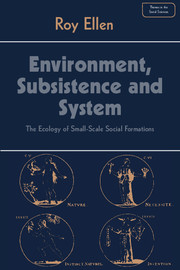Book contents
- Frontmatter
- Contents
- Preface
- Acknowledgements
- 1 ENVIRONMENTAL DETERMINISM AND CAUSAL CORRELATION
- 2 POSSIBILISM AND LIMITING FACTORS
- 3 CULTURAL ECOLOGY AND THE EXPLANATORY IMPERATIVE
- 4 HUMAN ECOLOGY AND THE BIOLOGICAL MODEL
- 5 THE FLOW OF ENERGY AND MATERIALS
- 6 ECOSYSTEMS AND SUBSISTENCE PATTERNS I
- 7 ECOSYSTEMS AND SUBSISTENCE PATTERNS II
- 8 SYSTEMS AND THEIR REGULATION
- 9 INFORMATION AND THE MANIPULATION OF THE ENVIRONMENT
- 10 ADAPTATION: A SUMMARY AND RECONSIDERATION
- 11 THE REPRODUCTION AND EVOLUTION OF SOCIAL AND ECOLOGICAL SYSTEMS
- 12 ECOLOGY IN ANTHROPOLOGICAL METHOD AND THEORY
- Notes
- Bibliography
- Name Index
- Subject Index
3 - CULTURAL ECOLOGY AND THE EXPLANATORY IMPERATIVE
Published online by Cambridge University Press: 05 June 2012
- Frontmatter
- Contents
- Preface
- Acknowledgements
- 1 ENVIRONMENTAL DETERMINISM AND CAUSAL CORRELATION
- 2 POSSIBILISM AND LIMITING FACTORS
- 3 CULTURAL ECOLOGY AND THE EXPLANATORY IMPERATIVE
- 4 HUMAN ECOLOGY AND THE BIOLOGICAL MODEL
- 5 THE FLOW OF ENERGY AND MATERIALS
- 6 ECOSYSTEMS AND SUBSISTENCE PATTERNS I
- 7 ECOSYSTEMS AND SUBSISTENCE PATTERNS II
- 8 SYSTEMS AND THEIR REGULATION
- 9 INFORMATION AND THE MANIPULATION OF THE ENVIRONMENT
- 10 ADAPTATION: A SUMMARY AND RECONSIDERATION
- 11 THE REPRODUCTION AND EVOLUTION OF SOCIAL AND ECOLOGICAL SYSTEMS
- 12 ECOLOGY IN ANTHROPOLOGICAL METHOD AND THEORY
- Notes
- Bibliography
- Name Index
- Subject Index
Summary
In Britain during the thirties environmental possibilism had been no more than a footnote to an empirical and functionalist sociology which was rapidly gaining in confidence and authority. In the United States it was largely an apology for cultural particularism. But dissatisfaction with the intellectual sterility of an empiricism which sought neither explanation nor generalization was to crystallize into a vigorous, if not always coherent, opposition. A regard for the tradition of Wissler and Kroeber, close disciplinary links with prehistoric archaeology (which tended to accentuate material culture and environmental relations), the absence of a dominant theoretical focus (such as existed in Britain) and a new interest in developments in biology all led to a renewed interest in the more positive treatment of relations between culture and environment. These developments conveniently focus on what has been labelled cultural ecology, and which is indissolubly associated with the name of Julian Steward.
JULIAN STEWARD
The work of Steward has been the greatest single influence on ethnographic ecology to have come from within anthropology. Although Steward had been influenced by Wissler and Kroeber, the differences between the respective approaches are crucial:
1. Kroeber and Wissler (and also Forde) had worked in an essentially geographical idiom. Steward, by contrast, was much more interested in the subtle interrelationships between environment and culture. His work was therefore much more ecological in the sense in which we would use this term today.
- Type
- Chapter
- Information
- Environment, Subsistence and SystemThe Ecology of Small-Scale Social Formations, pp. 52 - 65Publisher: Cambridge University PressPrint publication year: 1982



